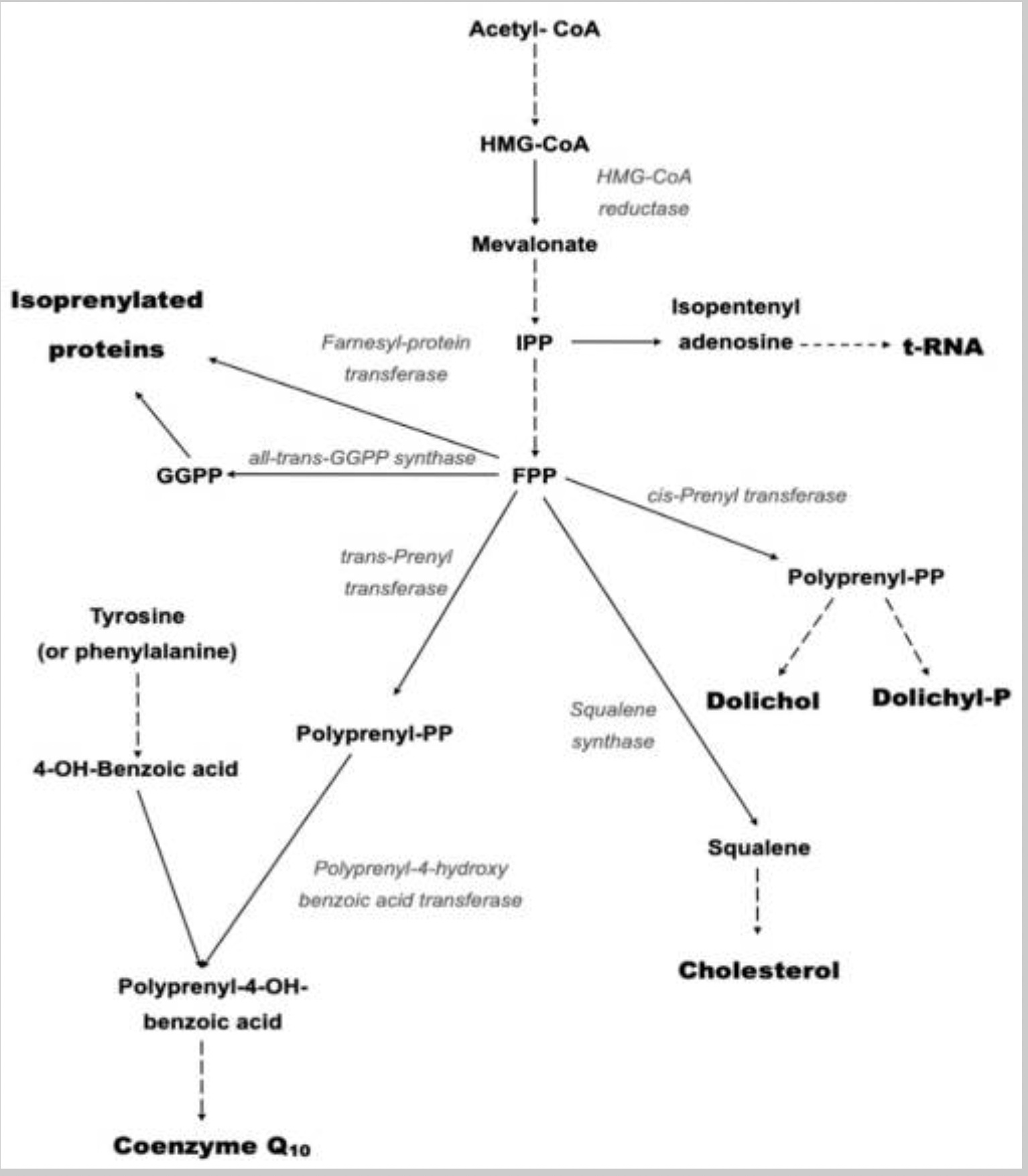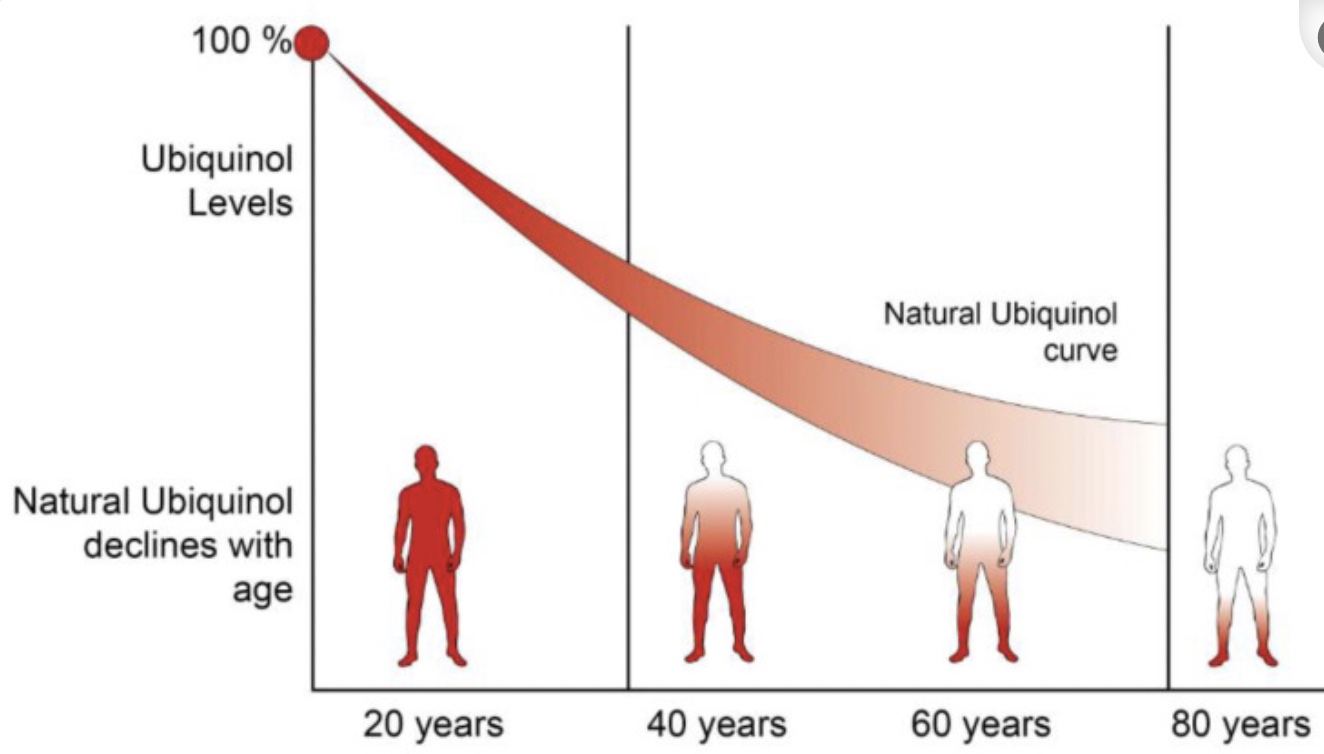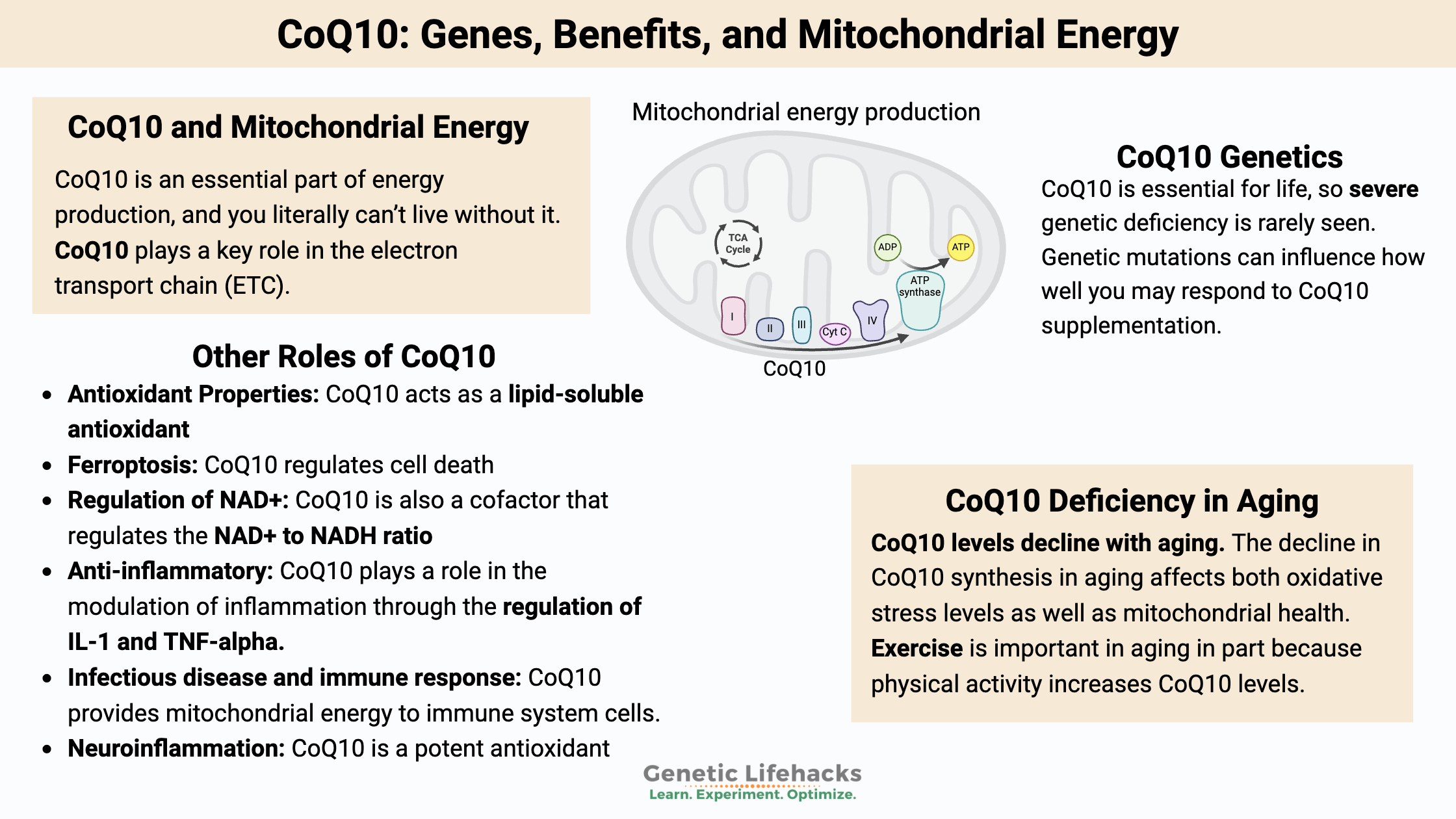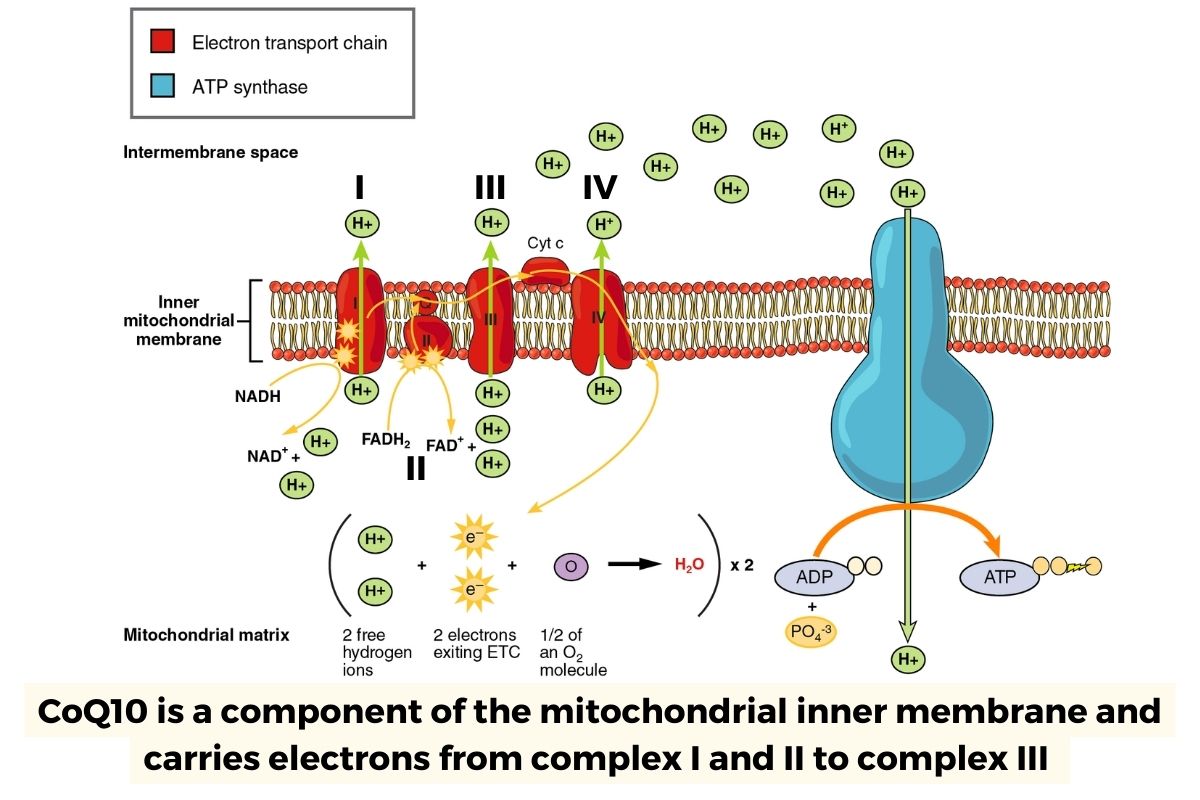Key takeaways:
~ CoQ10 is essential for mitochondrial energy (ATP) production.
~ In addition, CoQ10 acts as an antioxidant, protecting against neuroinflammation and cell death.
~ CoQ10 levels generally decrease with age, and optimizing CoQ10 levels may help with aging. Common medications can interfere with CoQ10 production.
~ Genetic variants can also impact Coenzyme Q10 levels and the efficacy of CoQ10 supplements.
Understanding Coenzyme Q10 (CoQ10): Key Roles and Health Benefits
Coenzyme Q, called CoQ10 or ubiquinone, is a fundamental part of how your cells make ATP for energy. From plants to yeast to all animal cells, coenzyme Q is essential for all forms of life.
Let’s dig into what CoQ10 does and how to optimize it for cellular health.
CoQ10 and Mitochondrial Energy:
Within cells, mitochondria produce most of the ATP used for cellular energy through the electron transport chain (ETC).
The ETC is a series of protein complexes, called complexes I through IV, that transfer electrons via redox reactions. This process creates a proton gradient across the mitochondrial membrane, which is used for ATP synthesis.
CoQ10 plays a key role in the ETC as an electron carrier, shuttling electrons from complexes I and II to complex III.[ref] Coenzyme Q is also known as ubiquinone. This name refers to its ubiquitous presence in all animal cells. In humans, CoQ10 is the most common form of coenzyme Q, referring to its 10 isoprenyl subunits. Other animals have different numbers of subunits, such as mice, which primarily produce CoQ9.
Beyond Energy: Diverse Health Roles of CoQ10
Click here to watch a short video I made on the health roles of CoQ10.
CoQ10 is an essential part of energy production, and you literally can’t live without it. But that is only part of the story.
Like many molecules in the body, CoQ10 is used by cells for multiple purposes. Being able to move electrons and act in redox reactions lets it function in several ways — limiting free radicals and linking several processes of aging.
Here are some of the roles CoQ10 plays:
Antioxidant Properties:
In its reduced form, CoQ10 acts as a lipid-soluble antioxidant, which allows it to neutralize oxidative stress within cells.[ref] Importantly, as a lipid-soluble antioxidant, CoQ10 can help to prevent the oxidation of LDL cholesterol.[ref][ref]
Ferroptosis: CoQ10 in regulating cell death
A type of regulated cell death, ferroptosis involves the accumulation of iron and ROS in a cell to cause apoptosis (cell death). CoQ10 is one of the ways that cells stop ferroptosis and regulate cell death.[ref]
Regulation of NAD+:
CoQ10 is also a cofactor that regulates the NAD+ to NADH ratio within the plasma membrane redox system. The NAD+ ratio is another essential part of how cells function and maintain cellular health.[ref]
Anti-inflammatory:
CoQ10 plays a role in the modulation of inflammation through the regulation of IL-1 and TNF-alpha. Studies show that supplemental CoQ10 also reduces CRP and IL-6.[ref]
Infectious disease and immune response:
Research shows that supplemental CoQ10 helps the immune response against pathogens, such as in sepsis and viral myocarditis. It takes a lot of energy to mount an immune response, so one role CoQ10 plays is to provide mitochondrial energy to immune system cells. In addition, as a lipid-soluble antioxidant, CoQ10 helps protect cells from cellular destruction caused by high levels of ROS in the immune response. Studies also show that in elderly patients with influenza, CoQ10 (200mg/day) reduces the severity and duration of illness. [ref]
In a large population study (4.5 million people), researchers investigated which current medications or supplements were associated with reduced severity and reduced risk of Covid-19. One of the strongest associations was CoQ10 supplementation, which reduced the risk of hospitalization by 85% in COVID patients.[ref]
Neuroinflammation:
Oxidative stress in the brain can cause neuroinflammation, and CoQ10 is a potent antioxidant. Patients with epilepsy have lower serum CoQ10 levels, on average, and CoQ10 plus seizure medications are more effective in reducing the frequency and duration of seizures. In Parkinson’s, though, clinical trials have shown mixed results.[ref][ref][ref]
Understanding CoQ10 Deficiency: Risks and Symptoms
With CoQ10 playing so many roles in health, it is unsurprising that low CoQ10 levels can negatively impact wellness in many ways.
Rare gene mutations and CoQ10 deficiency:
CoQ10 is essential for life, so severe genetic deficiency is rarely seen. In other words, CoQ10 is something you literally can’t live without, so a severe deficiency is incompatible with life. People with low or insufficient levels of CoQ10 may experience effects on the heart, brain, and more.
Rare genetic mutations that cause partial CoQ10 deficiency can have a big impact on health, causing encephalopathy, stroke, cerebral ataxia, spasticity, deafness, retinopathy, or intellectual disability.
Less severe CoQ10 genetic deficiency can cause exercise intolerance, muscular weakness, and ataxia later in life. Some genetic CoQ10 deficiency syndrome can be treated with high doses of supplemental CoQ10.[ref]
CoQ10 deficiency is regularly seen in aging:
In aging, CoQ10 deficiency or insufficiency may be more common. Levels generally decline in aging due to a reduction in CoQ10 synthesis. Studies show that older adults of both sexes often have lower serum CoQ10 concentrations and a decrease in CoQ10 redox capacity.[ref] Animal studies show that CoQ10 restoration in older mice helps reverse the loss of B-cell and T-cell function which is a part of aging and immunosenescence.[ref]
A clinical trial in elderly adults showed that CoQ10 plus selenium supplementation was associated with decreased days in the hospital and better physical performance and vitality over a four-year study. [ref]
Genetic studies suggest that CoQ10 may play a significant role in neurodegenerative diseases. A genome-wide association study identified several genes that are linked to slightly lower serum CoQ10 levels. These genes are also implicated in Alzheimer’s disease and dementia.[ref]
Most people associate supplemental CoQ10 with heart disease, and the heart needs a lot of CoQ10 for energy production. The anti-inflammatory effects of CoQ10 are thought to protect against cardiovascular disease.[ref]
Statins are the most prescribed class of drug in the U.S., and statins act to block the pathway involved in both LDL and CoQ10 production.[ref] A meta-analysis that involved data from 12 RCTs found that statins clearly reduce circulating CoQ10 levels. This reduction of CoQ10 was seen with all statin types and with using low, medium, or high-intensity statins.[ref]
Related article: Statins and Brain Fog
Chronic conditions that involve low CoQ10:
People with migraines have lower levels of CoQ10, and a small placebo-controlled clinical trial showed that CoQ10 reduced migraine frequency, severity, and duration.[ref]
Studies of chronic fatigue syndrome (ME/CFS) patients show a decrease in ATP synthesis and an increase in oxidative stress. Randomized, controlled trials of CoQ10 in ME/CFS show promise with decreased fatigue. However, it appears that CoQ10 helps a little, but doesn’t cure ME/CFS.[ref]
In Parkinson’s disease, the study results for CoQ10 are mixed. Trials with high doses, such as 1000 – 1200 mg/day, seem to show benefit. This would be a ‘talk to your doctor’ situation for someone with Parkinson’s.[ref]
Insulin resistance may also tie into low CoQ10. The inflammation and hyperinsulinemia is thought to prevent the expression of CoQ10 synthesis enzymes and reduce biosynthesis. This then leads to mitochondrial changes with excess ROS.[ref] A study in adults with pre-diabetes showed that 8 weeks of CoQ10 significantly reduced HOMA-IR levels, a marker for insulin resistance. However, there was no effect on HbA1c or fasting glucose.[ref]
In women with PCOS, CoQ10 supplementation lowers triglycerides, and a combination of CoQ10 and vitamin E reduces other lipid and hormonal levels.[ref]
More on clinical trials with CoQ10 are included in the Lifehacks section below. This molecule truly touches so many aspects of health.
The Biosynthesis of CoQ10 in Cells
The synthesis of coenzyme Q10 within cells is a complex process that involves multiple steps and genes.
1) The first step is the synthesis of benzoquinone from a derivative of either tyrosine or phenylalanine. Phenylalanine is an essential amino acid that we get from foods containing protein, and tyrosine is an amino acid that the body makes from phenylalanine.
2) A polyisoprenoid side chain is synthesized from acetyl-CoA via the mevalonate pathway. The mevalonate pathway also is involved in cholesterol synthesis and is the pathway inhibited by statins.
3) A final step is condensing the benzoquinone with the polyisoprenoid side chains to form coenzyme Q. In humans, CoQ10 is the most common form with 10 isoprenoid side chains.[ref]

Dietary Sources of CoQ10:
In addition to cellular synthesis, most people get about 5 mg/day of CoQ10 from their diet. Organ meats tend to have the highest levels of CoQ10, but many other foods can add CoQ10 in small amounts.
However, CoQ10 absorption from food isn’t great, and the body’s biosynthesis pathways are the main source of the molecule.
Aging, Mitochondrial Health, and CoQ10: Connecting the Dots
I want to circle back to something I mentioned above: CoQ10 levels decline with aging.
One theory of aging is that mitochondrial dysfunction and excessive production of reactive oxygen species (ROS) are integral causes of aging and age-related diseases. As we age, mitochondria in cells have decreased functionality and decreased proliferation. Overall, this would lead to a decrease in cellular health and bioenergetics.[ref]
CoQ10 is essential for mitochondrial energy production and acts as a lipid-based antioxidant within cells. The decline in CoQ10 synthesis in aging affects both oxidative stress levels as well as mitochondrial health.
Exercise is important in aging in part because physical activity increases CoQ10 levels. It is a two-way street here, with low CoQ10 levels causing decreased muscle strength and energy levels – and thus decreased ability to exercise.[ref]

Genetic Influences on CoQ10 Synthesis and Deficiency
The genes involved in the Coenzyme Q biosynthesis pathway include CoQ1 through CoQ11 (named for the date of identification), PDSS1, and PDSS2.[ref]
Primary coenzyme Q10 deficiency is rare and, if detected early enough (usually in infancy), can often be treated with CoQ10 supplementation. Mutations that severely limit CoQ10 production cause symptoms such as ataxia, encephalomyopathy, deafness, lactic acidosis, retinitis pigementosa, and hypertrophic cardiomyopathy.[ref][ref]
Mutations that don’t cause as severe a CoQ10 deficiency can cause problems with muscle control, walking, and balance in adulthood. One example is a case study of siblings who both had problems with writing (i.e. writer’s cramp) in their teens to 20s, which then progressed to problems riding a bike and eventually with walking. They were found to have a single mutation in one of the genes involved in CoQ10 biosynthesis.[ref]
Secondary CoQ10 deficiency results from genetic mutations that aren’t directly related to the synthesis of coenzyme Q. For example, mutations in genes related to tyrosine or phenylalanine, genes related to mitochondrial acyl-CoA synthesis, and certain genes related to heart disease.
In the genotype report section below, we’ll go through the specifics of these genetic variants.
Genotype Report: CoQ10
Rare mutations in CoQ10 synthesis genes:
Please keep in mind that not all of the possible mutations related to CoQ10 are covered here. The mutations and SNPs below are ones that are found in 23andMe or AncestryDNA data. Thus, you can’t use this to rule out a CoQ10 mutation. Also, keep in mind that 23andMe and AncestryDNA data are not guaranteed to be clinically accurate tests.
PDSS1 gene: encodes part of the CoQ10 molecule
Check your genetic data for rs863224162 (23andMe v5)
- G/G: typical
- G/T: carrier of a mutation for CoQ10 deficiency[ref]
Members: Your genotype for rs863224162 is —.
Check your genetic data for rs863224163 (23andMe v5)
- I/I (or CC): typical
- D/I: carrier of a mutation for CoQ10 deficiency[ref]
Members: Your genotype for rs863224163 is —.
CoQ9 gene: encodes part of the CoQ10 molecule
Check your genetic data for rs786205897 (23andMe v5):
- I/I (or GG): typical
- I/D: carrier of a rare, pathogenic mutation related to CoQ10 deficiency[ref]
Members: Your genotype for rs786205897 is —.
COQ8A gene: encodes part of the CoQ10 molecule
Check your genetic data for rs771578775 (23andMe v5):
- C/C: typical
- C/T: carrier of a rare, pathogenic mutation related to CoQ10 deficiency[ref]
Members: Your genotype for rs771578775 is —.
Check your genetic data for rs578189699 (23andMe v5):
- C/C: typical
- C/T: carrier of a rare, likely pathogenic mutation related to CoQ10 deficiency[ref]
Members: Your genotype for rs578189699 is —.
Check your genetic data for rs119468004 (23andMe v5):
- G/G: typical
- A/G: carrier of a rare, likely pathogenic mutation related to CoQ10 deficiency[ref]
Members: Your genotype for rs119468004 is —.
CoQ2 gene: encodes part of the CoQ10 molecule
Check your genetic data for rs121918233 (23andMe v5; AncestryDNA):
- C/C: typical
- C/T: carrier of a rare, likely pathogenic mutation related to CoQ10 deficiency[ref]
Members: Your genotype for rs121918233 is —.
Check your genetic data for rs121918232 (23andMe v5; AncestryDNA):
- T/T: typical
- C/T: carrier of a rare pathogenic mutation related to CoQ10 deficiency[ref]
Members: Your genotype for rs121918232 is —.
Check your genetic data for rs121918231 (23andMe v5; AncestryDNA):
- C/C: typical
- C/T: carrier of a rare pathogenic mutation related to CoQ10 deficiency[ref]
Members: Your genotype for rs121918231 is —.
Check your genetic data for rs121918230 (23andMe v5):
- T/T: typical
- C/T: carrier of a rare pathogenic mutation related to CoQ10 deficiency[ref]
Members: Your genotype for rs121918230 is —.
Lower CoQ10 levels (not rare mutations):
CoQ3 gene: encodes part of the CoQ10 molecule
Check your genetic data for rs6925344 (23andMe v5):
Members: Your genotype for rs6925344 is —.
NQO1 gene: encodes the enzyme NAD(P)H: quinone oxidoreductase 1 enzyme. NQO1 plays a role in the redox reactions that create the reduced state of CoQ10, which is how it acts as an antioxidant.[ref]
Check your genetic data for rs1800566 P187S (23andMe v4, v5; AncestryDNA):
- A/A: NQO1 *2 – non-functioning NQO1, higher risk of cancers from benzene, smoking[ref][ref]
- A/G: intermediate enzyme function, lower CoQ10 levels
- G/G: typical function
Members: Your genotype for rs1800566 is —.
Genetic interactions with CoQ10 supplementation:
CD36 gene: encodes a protein that affects the cellular uptake of CoQ10
Check your genetic data for rs1761667 (23andMe v5; older AncestryDNA files):
- A/A: higher serum levels of CoQ10 with supplements (better response) [ref] better physical and mental health with CoQ10 supplementation[ref]
- A/G: higher serum levels of CoQ10 with supplements (better response, better physical and mental health)
- G/G: typical response
Members: Your genotype for rs1761667 is —.
CYP7A1 gene: a plant sterol and cholesterol-related gene
Check your genetic data for rs3808607 (23andMe v4, v5; AncestryDNA):
- T/T: higher serum levels of CoQ10 with supplements (better response) [ref]
- G/T: typical response to CoQ10 supplementation
- G/G: typical response to CoQ10 supplementation
Members: Your genotype for rs3808607 is —.
NPC1L1 gene: cholesterol transporter that likely plays a role in the absorption of CoQ10 in the gut
Check your genetic data for rs2072183 (23andMe v5):
- C/C: higher serum levels of CoQ10 with supplements (better absorption) [ref]
- C/G: typical response
- G/G: typical response
Members: Your genotype for rs2072183 is —.
Lifehacks:
In this section, I’ll cover the different types of CoQ10 supplements (there’s a bunch), safety considerations, and clinical trials that involve CoQ10. The clinical trials give solid examples of conditions that may be helped with CoQ10.
Keep in mind that CoQ10 synthesis decreases with aging. The research studies on healthy younger adults show that they may not get as much benefit from CoQ10 supplements — unless they have a chronic disease that affects the mitochondria or a genetic mutation.
As always, talk with your doctor if you have medical questions about a supplement.


